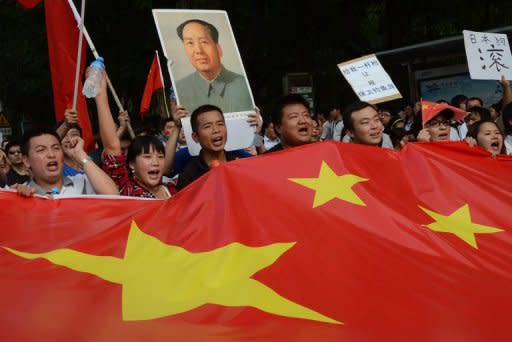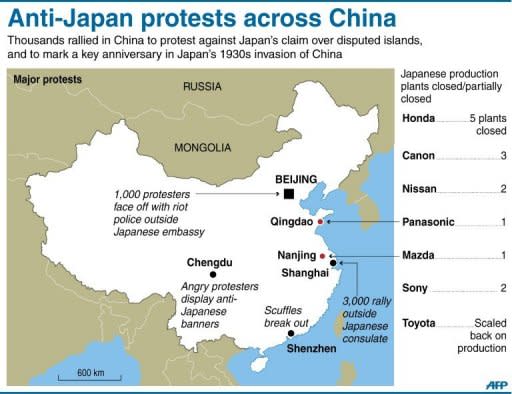Japan Inc. padlocks China factories amid violence
A swathe of Japan's biggest corporate names padlocked factories in China Tuesday as violent anti-Japan protests sparked safety fears, and threatened economic ties worth more than $300 billion a year. Firms ranging from electronics giants Sony and Panasonic to Japan's three big carmakers -- Toyota, Honda and Nissan -- temporarily halted production at some or all of their China-based plants as anger erupted over a disputed island chain claimed by Tokyo and Beijing. Mitsumi Electric, a major supplier to gaming giant Nintendo, said it had shuttered a factory in northeastern China after demonstrators broke into the plant causing extensive damage, including arson. "We don't know yet when we will be able to resume operations as the facilities are damaged," a company spokesman said. Komatsu, a mining and construction equipment maker, said stone-throwing protesters broke windows at one of its plants, while two of three Nissan factories -- none were damaged -- would be closed until at least Thursday. "The safety of our personnel is the highest priority," said Nissan spokesman Christopher Keefe. The closures came as thousands of anti-Japan protesters rallied again on Tuesday to mark the anniversary of a 1931 incident that led to Japan's invasion of Manchuria, a northeastern region of modern-day China. The current diplomatic battle has sparked fears of military conflict, drawing in US Defense Secretary Leon Panetta who called for calm in meetings with Chinese officials during an Asian tour. The islets, known as Senkaku in Japan and Diaoyu in China, are uninhabited but situated in rich fishing waters and said to sit atop valuable natural resources. They are controlled by Japan but claimed by China and Taiwan. The row intensified last week when the Japanese government bought three of the islands from their private Japanese owner, effectively nationalising them, and China responded by sending patrol ships to nearby waters. Yasuo Onishi, senior researcher at the government-backed Institute of Developing Economies, described the widespread Chinese demonstrations as "unprecedented in terms of the affected sectors and types of attacks". Safety fears prompted a delegation of 175 Japanese executives to cut short a regular annual trip to China, which included talks with Premier Wen Jiabao. "It is regrettable that politicians worsen the relations that have been built up over a long time by the private sectors of both countries," Hiromasa Yonekura, head of the Japan Business Federation, was quoted by Dow Jones Newswires as saying. China and Japan, the world's second and third-biggest economies respectively, have close business ties with two-way trade standing at a whopping $342.9 billion last year, according to Chinese figures. But the political relationship is often tense due to the territorial dispute and Chinese resentment over past conflicts and atrocities. "Japanese companies' sales and reputation with Chinese consumers are likely to be affected," ratings agency Fitch said in a note Tuesday. "However, there is little visibility on the extent to which their sales in China might be affected, and how long anti-Japanese protests may continue." On Tuesday, Honda said it had temporarily closed all five of its China plants, which make nearly one million vehicles a year, while rival Toyota said it had scaled back production but did not elaborate. Sony, which makes a range of products in China including televisions and cameras, said two of its seven factories would see a one-day shutdown on Tuesday. Panasonic also announced temporary plant closures. Fast Retailing, operator of the Uniqlo cheap chic clothing chain, switched off the lights at dozens of its Chinese outlets, a move followed by 7-Eleven convenience store operator Seven & i Holdings. Tokyo said it would press Beijing to assure the safety of its nationals and business interests in China, calling for it to adopt a "cool-headed manner" and noting that "Japanese companies have an important role in the Chinese economy and employment".




